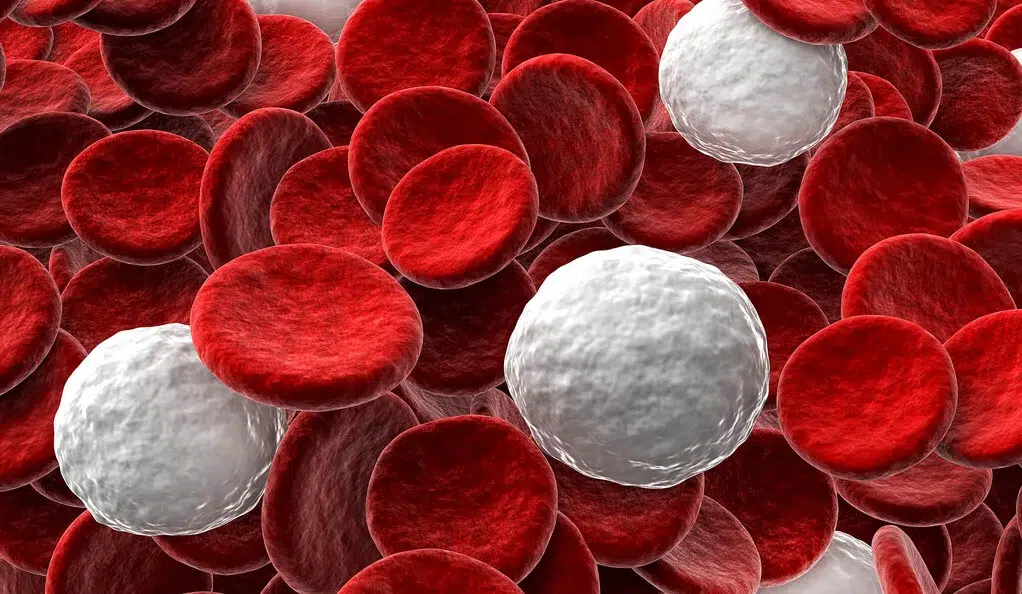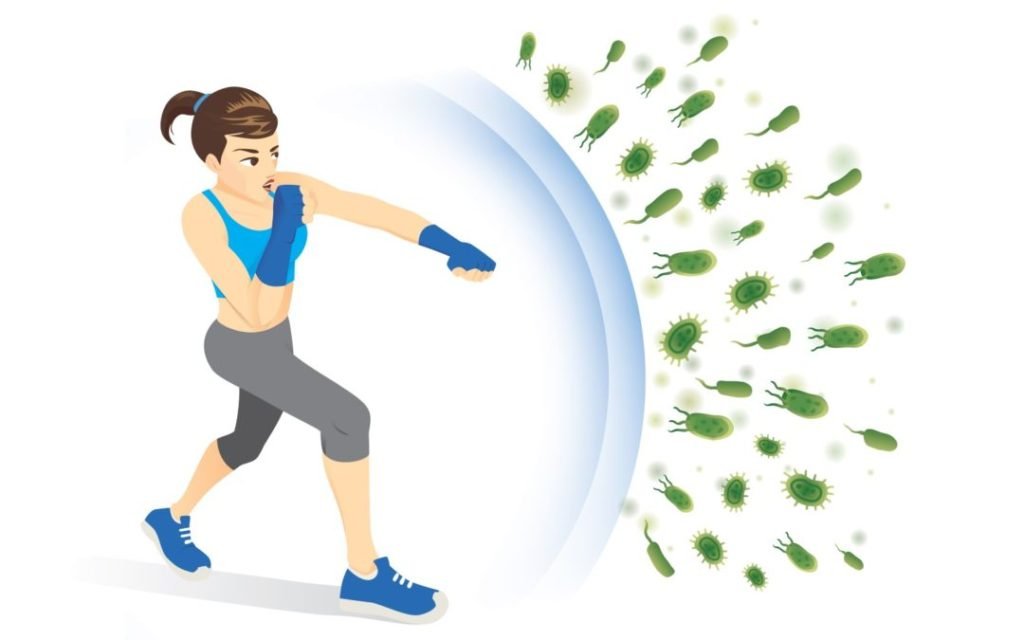Introduction
In recent years, especially since the onset of the coronavirus pandemic in 2020, enhancing our immune system has become a top priority for many. The World Health Organization (WHO) has reported various outbreaks, including the resurgence of COVID-19 variants and other infectious diseases. This underscores the urgent need to protect our health and strengthen our body’s defenses against infections. Taking proactive steps to bolster our immune system is essential, particularly during periods of isolation and uncertainty. This article delves into the crucial connection between exercise and immune function, offering insights on how regular physical activity can enhance your immune response and overall well-being.

Understanding the Immune System
The immune system is a sophisticated network of cells, tissues, and organs that work together to defend the body against harmful invaders, such as viruses, bacteria, and other pathogens. Key components of the immune system include:
White Blood Cells: The frontline defenders of the immune system. Produced in the bone marrow, they circulate through the bloodstream and lymphatic system to identify and eliminate harmful substances.
Antibodies: Proteins that recognize and neutralize foreign invaders, marking them for destruction by white blood cells.
Complement System: A group of proteins that enhance the ability of antibodies and white blood cells to clear pathogens from the body.
Lymphatic System: A network of vessels that transport lymph, a fluid containing infection-fighting white blood cells, throughout the body.
Spleen: An organ that filters blood, removing old or damaged cells and helping to produce immune components.
Bone Marrow: The spongy tissue inside bones that produces red blood cells, white blood cells, and platelets.
Thymus: An organ crucial for the development of T-lymphocytes, a type of white blood cell essential for immune response.
How the Immune System Responds to Infections
When pathogens invade the body, the immune system activates a series of responses to combat the infection. Memory cells, specifically T-lymphocytes and B-lymphocytes, play a critical role in this process. They remember previous encounters with specific germs, allowing the immune system to respond more rapidly and effectively if the same pathogens invade again.
Common illnesses, such as the flu or a cold, can be caused by various viruses. This variability means that recovering from one strain does not guarantee immunity against others, highlighting the importance of maintaining a robust immune system.

The Role of Exercise in Boosting Immunity
Exercise and Immune Function
Regular exercise is a powerful tool for enhancing immune function. Research indicates that engaging in physical activity can reduce the risk of respiratory infections by nearly half compared to sedentary individuals. But how does exercise contribute to a stronger immune system?
Anti-Inflammatory Effects
Exercise has numerous anti-inflammatory benefits. A study published in Brain, Behavior, and Immunity found that even a brief 20-minute workout could significantly boost the immune system and reduce inflammation. Regular physical activity increases the production of antibodies and T-cells, which are crucial for fighting infections.
The metabolic effects of exercise also play a role. When you engage in physical activity, your body burns nutrients more efficiently, preventing the accumulation of substances in the digestive tract that could lead to inflammation. Additionally, physical activity raises body temperature, which can inhibit bacterial growth and enhance the immune response.
Stress Hormones and Immunity
Exercise also helps reduce stress hormones, which can negatively impact immune function. Stress hormones like adrenaline and cortisol are released during physical activity and aid the body in responding to challenges.
Adrenaline: Produced by the adrenal glands, it prepares the body for quick action, enhancing alertness and energy.
Cortisol: This hormone regulates various bodily functions, including metabolism and the stress response. While necessary for certain functions, chronically high levels of cortisol can suppress immune activity.
Cortisol is a glucocorticoid hormone produced and released by the adrenal glands. It coordinates different body functions by carrying messages through the bloodstream to various organs, skin, muscles, and tissues. Maintaining balanced cortisol levels is crucial for optimal immune function.
Will Too Much Exercise Cause Adverse Effects?
While exercise is beneficial, overdoing it can lead to inflammation, oxidative stress, and muscle damage, all of which can undermine your immune system. Overtraining can weaken the immune response as the body focuses on repairing oxidative stress instead of combating respiratory infections.
Symptoms of Overexercising
Individuals who overexercise may experience symptoms such as:
Extended Muscle Soreness: Muscle soreness should typically last no more than three to four days.
Decreased Immune Response: An increase in illness frequency can indicate overtraining.
Increased Injuries: Frequent injuries may suggest the need to adjust your exercise routine.
Constant Fatigue and Irritability: Persistent exhaustion may signal that you are pushing your body too hard.
Research shows that intense workouts lasting over 90 minutes can temporarily weaken the immune system, leaving you more susceptible to infections.
The J-Curve Theory
Dr. David Nieman’s J-Curve Theory illustrates the relationship between exercise intensity and infection risk. Moderate exercise is linked to a lower risk of infection, while excessive training can lead to an increased risk. Therefore, maintaining a consistent exercise routine without overexertion is crucial for supporting your immune health.
Adapting Exercise During Isolation
The pandemic has posed unique challenges to maintaining an active lifestyle. While access to gyms and outdoor spaces may be limited, prioritizing physical activity is more important than ever. Fortunately, high-intensity workouts are not necessary to reap the immune-boosting benefits of exercise.
Strategies for Staying Active
Incorporate Light to Moderate Exercise: Activities such as walking, gardening, or doing household chores can significantly contribute to your daily physical activity.
Utilize Online Resources: Many virtual workout programs offer options ranging from yoga to high-intensity interval training (HIIT) that you can do at home.
Set Manageable Goals: Aim for at least 30 minutes of moderate-intensity exercise on most days. Consistency is key to long-term health benefits.
Frequently Asked Questions (FAQs)
How does exercise boost the immune system?
Exercise promotes good circulation, allowing immune cells and infection-fighting molecules to travel more efficiently throughout the body. It also reduces inflammation and supports the healthy turnover of immune cells.
What types of exercise are best for boosting immunity?
A combination of moderate aerobic activities (e.g., brisk walking, cycling, swimming) and strength training (e.g., weight lifting) is ideal. Aim for at least 150 minutes of moderate exercise weekly, along with two days of strength training.
Can too much exercise weaken the immune system?
Yes, excessive exercise can lead to overtraining, which weakens the immune system and increases susceptibility to infections. It’s essential to balance exercise with rest and proper nutrition.
How often should I exercise to see immune-boosting benefits?
Aim for regular, moderate exercise most days of the week—approximately 30 minutes of moderate-intensity activity five days a week.
Can exercise help if I’m already sick?
If you have mild symptoms, light to moderate exercise may be beneficial. However, if you’re experiencing more severe symptoms, such as a fever or flu, it’s best to rest until you fully recover.
How does exercise impact stress and immunity?
Exercise helps reduce stress by promoting the release of endorphins, enhancing mood. Lower stress levels positively affect immune function, as chronic stress can suppress immune responses.
Are there specific exercises recommended for immune health?
There are no specific exercises required; the key is to engage in regular, enjoyable physical activity. This can include walking, jogging, swimming, or participating in team sports.
How can I maintain my immune health through exercise as I age?
As you age, it’s crucial to continue regular physical activity, tailoring exercises to your changing abilities. Low-impact activities such as walking, swimming, and yoga are excellent choices, along with strength training to maintain muscle mass.
Conclusion
Boosting your immune system through exercise is not just beneficial; it’s essential, especially in today’s world. The recent outbreaks reported by the WHO remind us of the ongoing challenges we face regarding infectious diseases. By understanding how physical activity enhances immune function and finding the right balance, you can protect your health and well-being. Whether you engage in moderate aerobic activities or strength training, the key is consistency. Embrace the opportunity to stay active, even in challenging times, and take proactive steps to fortify your immune defenses. Your body—and your immune system—will thank you.
Our personal training allows you to meet your lifestyle needs and is flexible to fit into your busy schedule. Feel free to contact us for details.
- Permanently Closed Gyms in Singapore: Complete 2016-2025 List & Why You Need to Choose Wisely - December 29, 2025
- Beyond the Comfort Zone: Embracing the Unknown in Fitness and Life - November 14, 2025
- Why Traditional Gyms Don’t Work (And What Does): The Anti-Gym Revolution - November 14, 2025

One Response